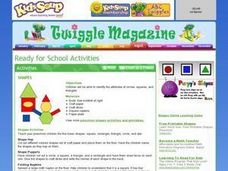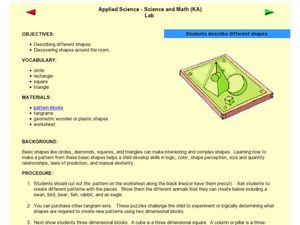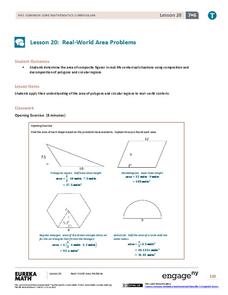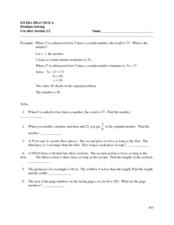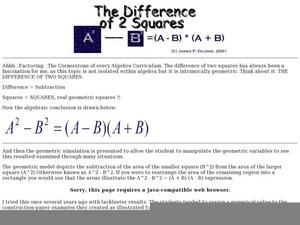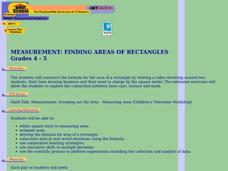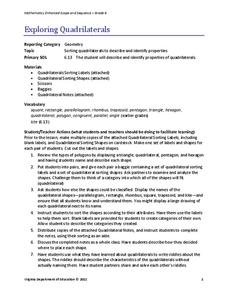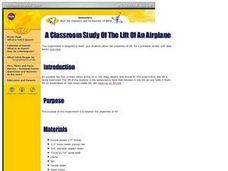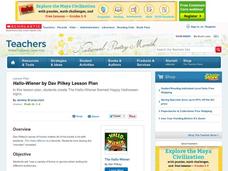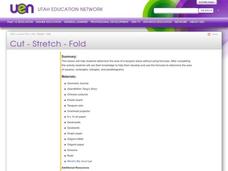Curated OER
Measurement: Finding Areas of Rectangles
Gardening geometers construct the formula for the area of a rectangle by viewing a video revolving around two young people, their lawn mowing business, and their need to charge by the square meter. A relevant real-life application lesson!
Illustrative Mathematics
Fractions and Rectangles
Visual models are excellent teaching tools when explaining equivalent fractions. Looking at a rectangle cut into twelfths, learners first identify the shaded fraction, and then explain whether the fraction is equal to one-fourth....
Curated OER
Branding Circles, Squares, Rectangles, Triangles
Compare and classify 2-D shapes! Kindergarteners inspect the attributes of plane shapes and examine shapes in everyday life. They label the circles, squares, rectangles, and triangles they find. This is the website where you can find the...
Curated OER
Shapes Activities and Lessons
A fabulous lesson on identifying circles, triangles, squares, and rectangles awaits your students. They use large motor skills hopping from shape to shape, use visual and kinesthetic skills passing a ball of yarn between three people to...
Curated OER
Applied Science - Science and Math (K) Lab
In this shape lesson, learners cut out tangram shapes and create different pictures with them. They look at 3-D shapes as well. There is a nice, hands-on component built into this lesson.
Alabama Learning Exchange
Twisted Tangrams
Primary geometers create a picture using tangrams. For this geometry lesson, students read Grandfather Tang: A Tale Told with Tangrams, cut out their own tangrams, and choose a character from the story to make using their tangram pieces.
EngageNY
Real-World Area Problems
Not all structures take the shape of a polygon. The 21st lesson in a series of 29 shows young mathematicians they can create polygons out of composite shapes. Once they deconstruct the structures, they find the area of the composite figure.
Curated OER
Cutting Corners
Second graders examine two-dimensional shapes using their characteristics. In this shapes lesson, 2nd graders identify similarities and differences by using cut out shapes, diagrams, mirrors, and graphic organizers.
Illustrative Mathematics
Lines of Symmetry for Quadrilaterals
Explore how lines of symmetry help define different categories of quadrilaterals. Looking at a square, rectangle, trapezoid, and parallelogram, young mathematicians discover that each shape has its own, unique symmetry. Encourage your...
Curated OER
Pythagorean Theorem by Graphic Manipulation
There are many different ways to show a proof of the Pythagorean Theorem. Here is a nice hands-on paper cutting activity that shows a graphic representation. You can even challenge your young Pythagoreans to come up with their own...
Curated OER
Literacy Activity: Mouse Shapes
Students listen to the book Mouse Shapes and identify the shapes in the book as it is being read. In this shapes lesson, students identify the shapes in the book, and then play with cut out shapes that they can hold in their hands.
Virginia Department of Education
Quadrilateral Sort
If only you had a Sorting Hat to sort out quadrilaterals. Learners sort cutouts of quadrilaterals based on their properties and attributes. A flowchart helps them organize the results of the activity.
Curated OER
TI Calculator
In this algebra worksheet, 11th graders troubleshoot the TI-83/84 graphing calculator. They review the proper process to use when entering equations and fractions into the calculator. There are 4 example problems worked out.
Curated OER
The Difference of 2 Squares
Learners factor a difference of two squares. In this factoring a difference of two squares lesson, students use manipulates cut from a piece of paper to illustrate the difference of two squares. Learners illustrate the...
Curated OER
Measurement: Finding Areas of Rectangles
Students construct the formula for the area of a rectangle.
Virginia Department of Education
Exploring Quadrilaterals
Sort this resource into the Use pile. Scholars investigate attributes of quadrilaterals and then use the results to sort and classify the shapes labeling each figure with their properties to justify the classifications.
Curated OER
A First Look at the Garden
For any teacher who is planning a field trip to Missouri's Botanical Garden, this lesson packet is a must-have! In it, young learners engage in pre-visit activities so they will be prepared to get the most out of their trip. There are...
EngageNY
Perimeter and Area of Polygonal Regions in the Cartesian Plane
How many sides does that polygon have? Building directly from lesson number eight in this series, learners now find the area and perimeter of any polygon on the coordinate plane. They decompose the polygons into triangles and use Green's...
Curated OER
What Does It Take?
First graders study the attributes of circles, squares, triangles and rectangles. They sort shapes that are the same and those that are different into groups.
Curated OER
Maximizing Lumber Cuts
Students examine how lumber companies use each tree to the fullest extent. They practice using a saw blade in which they cut a piece of wood in different configurations to see which cut can waste the least.
Curated OER
A Clasroom Study of the Life of an Airplane
Students participate in an experiment to discover the properties of lift. They work together to complete calculations and collect data. They share their results with the class.
Curated OER
Hallo-Wiener Lesson Plan
Students listen to the story The Hallo-Wiener by Dav Pilkey in order to learn about the "monster" character. In this reading and art lesson plan, students cut a "bun" from beige construction paper, cut out an image of the main character...
Curated OER
Area of Tangram Pieces
Mathematicians calculate the area of a tangram piece without using formulas. They use a geometry journal to record activities during this lesson. They make a set of tangrams and use them to compute area. They use...
Curated OER
City Streets: A Fold-up of a Street Lined with Buildings
After walking in a nearby neighborhood, have your class create this amazing city street pop-up. They study the facades of the buildings they see, focusing on geometric line, shape, and architecture. They then draw, cut, and create a city...



